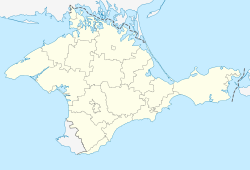Simeiz
|
Simeiz Сімеїз |
|||
|---|---|---|---|
|
|||
| Location of Simeiz within the Crimea | |||
| Coordinates: 44°24′21″N 33°59′24″E / 44.40583°N 33.99000°ECoordinates: 44°24′21″N 33°59′24″E / 44.40583°N 33.99000°E | |||
| Country | Russia/Ukraine | ||
| Republic | Crimea | ||
| Municipality | Yalta Municipality | ||
| Local council | Simeiz | ||
| Elevation | 100 m (300 ft) | ||
| Population (2014) | |||
| • Total | 2,604 | ||
| Time zone | MSK (UTC+4) | ||
| Postal code | 98680 — 98682 | ||
| Area code(s) | +380-654 | ||
| Climate | Cfb | ||
Simeiz (Ukrainian: Сімеїз, Russian: Симеи́з, Crimean Tatar: Simeiz) is a resort town, an urban-type settlement in Yalta Municipality in the Autonomous Republic of Crimea, a territory recognized by a majority of countries as part of Ukraine and incorporated by Russia as the Republic of Crimea. Its name is of Greek origin (σημαία 'flag' + -εις, a plural suffix). The town is located by the southern slopes of the main range of Crimean Mountains at the base of Mount Koshka, 18 kilometers (11 mi) west from Yalta. Population: 2,604 (2014 Census).
There are prehistoric dolmens and fortifications nearby; in the Middle Ages the area was under the control of the Byzantine Empire, which built a fortified monastery in the vicinity (and may have given the town its name). As the Byzantine power weakened, the area fell under the control of Genoa, which in its turn gave way to the Ottoman Empire; under the Ottomans the village was ruled from Mangup. By 1778, with the departure of the Christian population, the village was depopulated.
In 1828 Simeiz came into the ownership of Ivan Akimovich Maltsov, who planted grapevines and fruit orchards; at the start of the 20th century his descendants created a resort, Novy Simoiz, which quickly became one of the most prestigious resorts in the Crimea. This period saw the construction of a park and a number of villas which remain to this day. In 1912 Nicholas II visited with his family. After the October Revolution, Simeiz was nationalized and public sanatoriums were created, mainly specializing in tuberculosis. In 1927 Simeiz was visited by around 10,000 people.
...
Wikipedia



